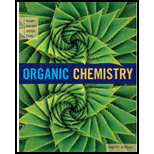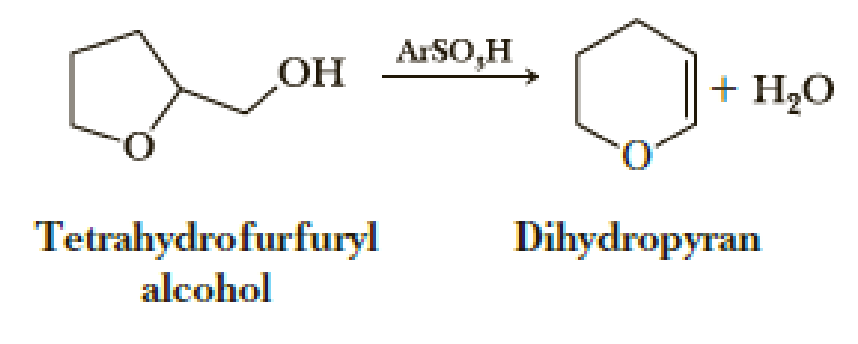
ORGANIC CHEMISTRY-OWL V2 ACCESS
8th Edition
ISBN: 9781305582422
Author: Brown
Publisher: CENGAGE L
expand_more
expand_more
format_list_bulleted
Concept explainers
Textbook Question
Chapter 10, Problem 10.39P
Dihydropyran is synthesized by treating tetrahydrofurfuryl alcohol with an arenesulfonic acid, ArSO3H. Propose a mechanism for this conversion.

Expert Solution & Answer
Trending nowThis is a popular solution!

Students have asked these similar questions
how many moles of H2O2 are required to react with 11g of N2H4 according to the following reaction? (atomic weights: N=14.01, H=1.008, O= 16.00) 7H2O2 + N2H4 -> 2HNO3 + 8H20
calculate the number of moles of H2 produced from 0.78 moles of Ga and 1.92 moles HCL? 2Ga+6HCL->2GaCl3+3H2
an adult human breathes 0.50L of air at 1 atm with each breath. If a 50L air tank at 200 atm is available, how man y breaths will the tank provide
Chapter 10 Solutions
ORGANIC CHEMISTRY-OWL V2 ACCESS
Ch. 10.1 - Write IUPAC names for these alcohols and include...Ch. 10.1 - Classify each alcohol as primary, secondary, or...Ch. 10.1 - Write IUPAC names for these unsaturated alcohols.Ch. 10.2 - Arrange these compounds in order of increasing...Ch. 10.2 - Prob. 10.5PCh. 10.4 - Predict the position of equilibrium for this...Ch. 10.5 - Show how to convert (R)-2-pentanol to...Ch. 10.6 - Draw structural formulas for the alkenes formed by...Ch. 10.6 - Propose a mechanism to account for this...Ch. 10.7 - Propose a mechanism to account for the following...
Ch. 10.7 - Prob. AQCh. 10.7 - Prob. BQCh. 10.7 - Prob. CQCh. 10.7 - Prob. DQCh. 10.7 - Which step in the reaction would you expect to be...Ch. 10.7 - Prob. FQCh. 10.7 - Prob. GQCh. 10.8 - Prob. 10.11PCh. 10.8 - Prob. AQCh. 10.8 - Prob. BQCh. 10.8 - Prob. CQCh. 10.8 - Why does nature use a reagent as complex as NAD+...Ch. 10.8 - -Hydroxyketones and -hydroxyaldehydes are also...Ch. 10.9 - Write IUPAC names for these thiols.Ch. 10 - Which are secondary alcohols?Ch. 10 - Name each compound.Ch. 10 - Prob. 10.16PCh. 10 - Name and draw structural formulas for the eight...Ch. 10 - Arrange these compounds in order of increasing...Ch. 10 - Arrange these compounds in order of increasing...Ch. 10 - Prob. 10.20PCh. 10 - Prob. 10.21PCh. 10 - Arrange the compounds in each set in order of...Ch. 10 - Prob. 10.23PCh. 10 - The decalinols A and B can be equilibrated using...Ch. 10 - Prob. 10.25PCh. 10 - Select the stronger acid from each pair and...Ch. 10 - Prob. 10.27PCh. 10 - In each equilibrium, label the stronger acid, the...Ch. 10 - Write equations for the reaction of 1-butanol with...Ch. 10 - Write equations for the reaction of 2-butanol with...Ch. 10 - Prob. 10.31PCh. 10 - When (R)-2-butanol is left standing in aqueous...Ch. 10 - Two diastereomeric sets of enantiomers, A/B and...Ch. 10 - Acid-catalyzed dehydration of 3-methyl-2-butanol...Ch. 10 - Show how you might bring about the following...Ch. 10 - Propose a mechanism for the following pinacol...Ch. 10 - Prob. 10.37PCh. 10 - Show how each alcohol or diol can be prepared from...Ch. 10 - Dihydropyran is synthesized by treating...Ch. 10 - Show how to convert propene to each of these...Ch. 10 - Prob. 10.41PCh. 10 - Prob. 10.42PCh. 10 - The tosylate of a primary alcohol normally...Ch. 10 - Prob. 10.44PCh. 10 - Show how to convert cyclohexene to each compound...Ch. 10 - Prob. 10.46PCh. 10 - Ethanol (CH3CH2OH) and dimethyl ether (CH3OCH3)...Ch. 10 - Prob. 10.48PCh. 10 - Prob. 10.49PCh. 10 - Prob. 10.50PCh. 10 - Write the products of the following sequences of...Ch. 10 - Alcohols are important for organic synthesis,...Ch. 10 - Using your reaction roadmap as a guide, show how...Ch. 10 - Using your reaction roadmap as a guide, show how...Ch. 10 - Using your reaction roadmap as a guide, show how...Ch. 10 - Using your reaction roadmap as a guide, show how...Ch. 10 - Prob. 10.57PCh. 10 - Prob. 10.58PCh. 10 - Prob. 10.59P
Additional Science Textbook Solutions
Find more solutions based on key concepts
Gregor Mendel never saw a gene, yet he concluded that some inherited factors were responsible for the patterns ...
Campbell Essential Biology (7th Edition)
Identify me theme or themes exemplified by (a) the sharp quills of a porcupine (b) the development of a multice...
Campbell Biology in Focus (2nd Edition)
Describe the evolution of mammals, tracing their synapsid lineage from early amniote ancestors to true mammals....
Loose Leaf For Integrated Principles Of Zoology
Give the IUPAC name for each compound.
Organic Chemistry
Label each statement about the polynucleotide ATGGCG as true or false. The polynucleotide has six nucleotides. ...
General, Organic, and Biological Chemistry - 4th edition
6. How can you use the features found in each chapter?
Human Anatomy & Physiology (2nd Edition)
Knowledge Booster
Learn more about
Need a deep-dive on the concept behind this application? Look no further. Learn more about this topic, chemistry and related others by exploring similar questions and additional content below.Similar questions
- Using reaction free energy to predict equilibrium composition Consider the following equilibrium: 2NO2 (g) = N2O4(g) AGº = -5.4 kJ Now suppose a reaction vessel is filled with 4.53 atm of dinitrogen tetroxide (N2O4) at 279. °C. Answer the following questions about this system: Under these conditions, will the pressure of N2O4 tend to rise or fall? Is it possible to reverse this tendency by adding NO2? In other words, if you said the pressure of N2O4 will tend to rise, can that be changed to a tendency to fall by adding NO2? Similarly, if you said the pressure of N2O4 will tend to fall, can that be changed to a tendency to '2' rise by adding NO2? If you said the tendency can be reversed in the second question, calculate the minimum pressure of NO 2 needed to reverse it. Round your answer to 2 significant digits. 00 rise ☐ x10 fall yes no ☐ atm G Ar 1arrow_forwardWhy do we analyse salt?arrow_forwardCurved arrows are used to illustrate the flow of electrons. Using the provided starting and product structures, draw the curved electron-pushing arrows for the following reaction or mechanistic step(s). Be sure to account for all bond-breaking and bond-making steps. H H CH3OH, H+ H Select to Add Arrows H° 0:0 'H + Q HH ■ Select to Add Arrows CH3OH, H* H. H CH3OH, H+ HH ■ Select to Add Arrows i Please select a drawing or reagent from the question areaarrow_forward
- What are examples of analytical methods that can be used to analyse salt in tomato sauce?arrow_forwardA common alkene starting material is shown below. Predict the major product for each reaction. Use a dash or wedge bond to indicate the relative stereochemistry of substituents on asymmetric centers, where applicable. Ignore any inorganic byproducts H Šali OH H OH Select to Edit Select to Draw 1. BH3-THF 1. Hg(OAc)2, H2O =U= 2. H2O2, NaOH 2. NaBH4, NaOH + Please select a drawing or reagent from the question areaarrow_forwardWhat is the MOHR titration & AOAC method? What is it and how does it work? How can it be used to quantify salt in a sample?arrow_forward
- Predict the major products of this reaction. Cl₂ hv ? Draw only the major product or products in the drawing area below. If there's more than one major product, you can draw them in any arrangement you like. Be sure you use wedge and dash bonds if necessary, for example to distinguish between major products with different stereochemistry. If there will be no products because there will be no significant reaction, just check the box under the drawing area and leave it blank. Note for advanced students: you can ignore any products of repeated addition. Explanation Check Click and drag to start drawing a structure. 80 10 m 2025 McGraw Hill LLC. All Rights Reserved. Terms of Use | Privacy Center | Accessibility DII A F1 F2 F3 F4 F5 F6 F7 F8 EO F11arrow_forwardGiven a system with an anodic overpotential, the variation of η as a function of current density- at low fields is linear.- at higher fields, it follows Tafel's law.Calculate the range of current densities for which the overpotential has the same value when calculated for both cases (the maximum relative difference will be 5%, compared to the behavior for higher fields).arrow_forwardUsing reaction free energy to predict equilibrium composition Consider the following equilibrium: N2 (g) + 3H2 (g) = 2NH3 (g) AGº = -34. KJ Now suppose a reaction vessel is filled with 8.06 atm of nitrogen (N2) and 2.58 atm of ammonia (NH3) at 106. °C. Answer the following questions about this system: rise Under these conditions, will the pressure of N2 tend to rise or fall? ☐ x10 fall Is it possible to reverse this tendency by adding H₂? In other words, if you said the pressure of N2 will tend to rise, can that be changed to a tendency to fall by adding H2? Similarly, if you said the pressure of N will tend to fall, can that be changed to a tendency to rise by adding H₂? If you said the tendency can be reversed in the second question, calculate the minimum pressure of H₂ needed to reverse it. Round your answer to 2 significant digits. yes no ☐ atm Х ด ? olo 18 Ararrow_forward
arrow_back_ios
SEE MORE QUESTIONS
arrow_forward_ios
Recommended textbooks for you
 Organic ChemistryChemistryISBN:9781305580350Author:William H. Brown, Brent L. Iverson, Eric Anslyn, Christopher S. FootePublisher:Cengage Learning
Organic ChemistryChemistryISBN:9781305580350Author:William H. Brown, Brent L. Iverson, Eric Anslyn, Christopher S. FootePublisher:Cengage Learning
 Introduction to General, Organic and BiochemistryChemistryISBN:9781285869759Author:Frederick A. Bettelheim, William H. Brown, Mary K. Campbell, Shawn O. Farrell, Omar TorresPublisher:Cengage Learning
Introduction to General, Organic and BiochemistryChemistryISBN:9781285869759Author:Frederick A. Bettelheim, William H. Brown, Mary K. Campbell, Shawn O. Farrell, Omar TorresPublisher:Cengage Learning Chemistry: Principles and ReactionsChemistryISBN:9781305079373Author:William L. Masterton, Cecile N. HurleyPublisher:Cengage Learning
Chemistry: Principles and ReactionsChemistryISBN:9781305079373Author:William L. Masterton, Cecile N. HurleyPublisher:Cengage Learning

Organic Chemistry
Chemistry
ISBN:9781305580350
Author:William H. Brown, Brent L. Iverson, Eric Anslyn, Christopher S. Foote
Publisher:Cengage Learning


Introduction to General, Organic and Biochemistry
Chemistry
ISBN:9781285869759
Author:Frederick A. Bettelheim, William H. Brown, Mary K. Campbell, Shawn O. Farrell, Omar Torres
Publisher:Cengage Learning

Chemistry: Principles and Reactions
Chemistry
ISBN:9781305079373
Author:William L. Masterton, Cecile N. Hurley
Publisher:Cengage Learning
Coenzymes and cofactors; Author: CH15 SWAYAM Prabha IIT Madras;https://www.youtube.com/watch?v=bubY2Nm7hVM;License: Standard YouTube License, CC-BY
Aromaticity and Huckel's Rule; Author: Professor Dave Explains;https://www.youtube.com/watch?v=7-BguH4_WBQ;License: Standard Youtube License